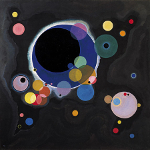Frequency-specific patterns of neural activity are traditionally interpreted as sustained rhythmic oscillations, and related to cognitive mechanisms such as attention, high level visual processing or motor control. While alpha waves (8-12 Hz) are known to closely resemble short sinusoids, and thus are revealed by Fourier analysis or wavelet transforms, there is an evolving debate that electromagnetic neural signals are composed of more complex waveforms that cannot be analyzed by linear filters and traditional signal representations. In this paper, we propose to learn dedicated representations of such recordings using a multivariate convolutional sparse coding (CSC) algorithm. Applied to electroencephalography (EEG) or magnetoencephalography (MEG) data, this method is able to learn not only prototypical temporal waveforms, but also associated spatial patterns so their origin can be localized in the brain. Our algorithm is based on alternated minimization and a greedy coordinate descent solver that leads to state-of-the-art running time on long time series. To demonstrate the implications of this method, we apply it to MEG data and show that it is able to recover biological artifacts. More remarkably, our approach also reveals the presence of non-sinusoidal mu-shaped patterns, along with their topographic maps related to the somatosensory cortex.
Work published at NeurIPS 2018 conference. Pdf : https://arxiv.org/abs/1805.09654

 PDF version
PDF version
